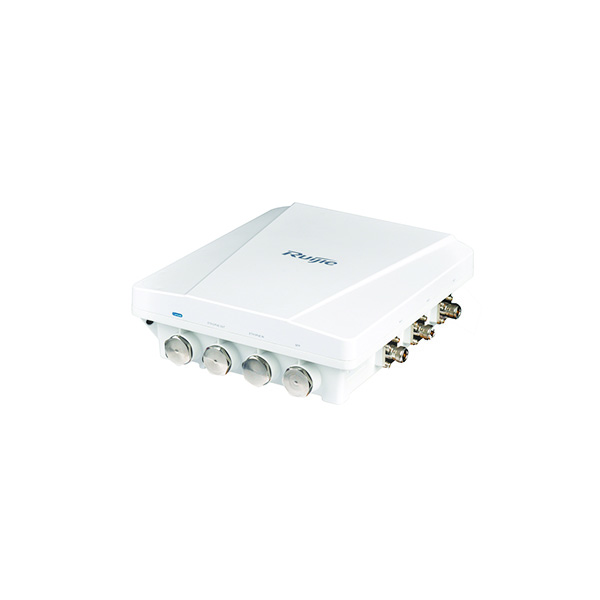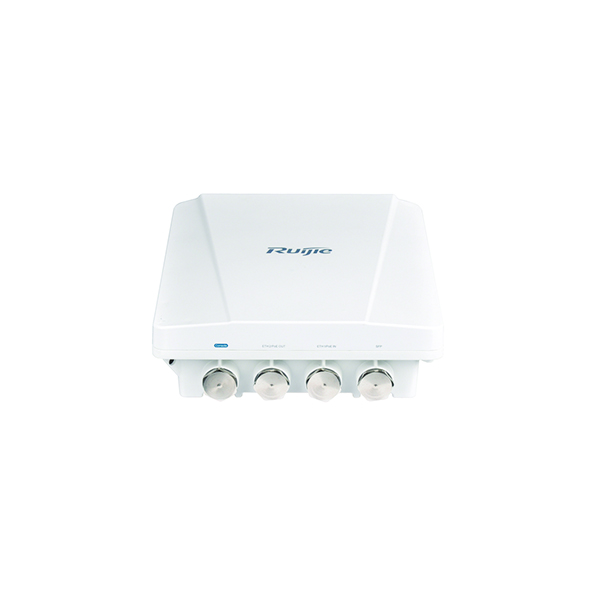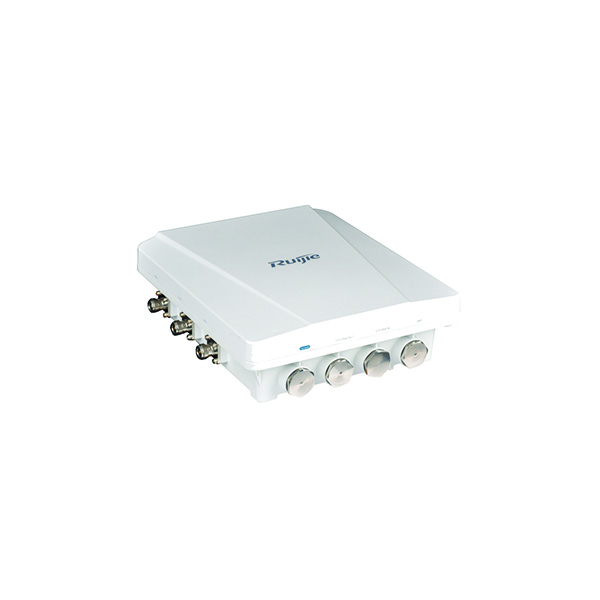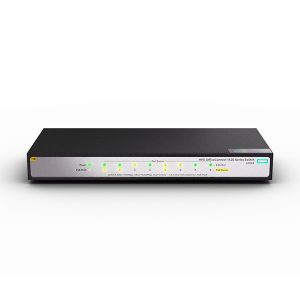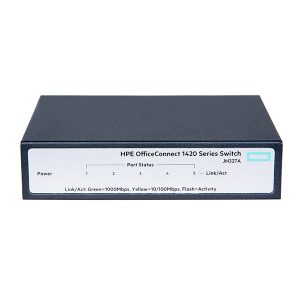| Model | RG-AP630(IDA2) | |||
| Target Deployments | For big campus, wireless city, harbour, storage room, mine | |||
|
Basic Specifications |
Radio |
Concurrent dual-radio dual-band |
||
| Protocol |
802.11a/b/g/n/ac Wave2 |
|||
| Operating Bands |
802.11b/g/n: 2.4GHz to 2.483GHz |
|||
|
802.11a/n/ac: 5.150GHz to 5.350GHz, 5.47GHz to 5.725GHz, 5.725GHz to 5.850GHz |
||||
|
(vary depending on countries) |
||||
| Antenna |
Built-in Directional Smart Antenna (support external/internal antenna switching) |
|||
|
|
||||
| Antenna Gain |
10dBi |
|||
| Max Throughput |
Build-in antenna model: 800Mbps@2.4G |
|||
|
1733Mbps@5G |
||||
|
2.533Gbps per AP; |
||||
|
External antenna model: |
||||
|
400Mbps@2.4G |
||||
|
1733Mbps@5G |
||||
|
2.133Gbps per AP |
||||
| Spatial Streams |
4 |
|||
| Modulation |
OFDM: BPSK@6/9Mbps |
|||
|
QPSK@12/18Mbps |
||||
|
16-QAM@24Mbps |
||||
|
64-QAM@48/54Mbps |
||||
|
DSSS: DBPSK@1Mbps |
||||
|
DQPSK@2Mbps |
||||
|
CCK@5.5/11Mbps |
||||
|
MIMO-OFDM: BPSK, QPSK, 16QAM, 64QAM and 256QAM |
||||
| Receiver Sensitivity |
11b: -99dBm(1Mbps), -93dBm(5.5Mbps), -90dBm(11Mbps) |
|||
|
11a/g:-93dBm(6Mbps), -85dBm(24Mbps), -82dBm(36Mbps), – 77dBm(54Mbps) |
||||
|
11n:-92dBm@MCS0, -73dBm@MCS7, -92dBm@MCS8, -73dBm@MCS15 |
||||
|
11ac HT20: -90dBm (MCS0) , -63dBm (MCS9) |
||||
|
11ac HT40: -85dBm(MCS0) , -60dBm (MCS9) |
||||
|
11ac HT80: -82dBm(MCS0) , -58dBm (MCS9) |
||||
| Maximum Transmit Power |
27dBm |
|||
|
Note: The transmit power is configurable to up to 15dBm in 1dBm steps. The actual transmit power depends on local laws and regulations. |
||||
| Adjustable Power |
1dBm |
|||
| IP Rating | IP67 | |||
|
Ports |
Service Port |
|
||
|
One 1000M SFP Port(Combo Port) |
||||
|
|
One 10/100/1000Base-T Port(ETH1/PoE IN);One 10/100/1000Base-T Port(ETH2); |
|
||
| Management Port |
1 Console Port(RJ45) |
|||
|
Power |
Power Supply |
PoE+ (802.3at) |
||
| Power Consumption |
<25W |
|||
| WLAN | Maximum clients per AP |
Up to 512 |
||
| SSID capacity |
Up to 16 per radio |
|||
|
Up to 32 per AP |
||||
| SSID hiding |
Support |
|||
| Configuring the authentication mode. Encryption mechanism and VLAN attributes for each SSID |
Support |
|||
| Remote Intelligent Perception Technology (RIPT) |
Support |
|||
| X-speed |
Support |
|||
| Intelligent load balancing based on the number of users or traffic |
Support |
|||
| STA control |
SSID/radio-based |
|||
| Bandwidth control |
STA/SSID/AP-based speed control |
|||
| Preference for 5GHz (band select) |
Support |
|||
| Wireless position tracking |
Support |
|||
| Dynamic Frequency Selection(DFS) |
Future Release Support |
|||
|
Security |
PSK, Web, and 802.1x authentication |
Support |
||
| Data encryption |
WPA (TKIP) , WPA2 (AES), WPA-PSK, and WEP (64 or 128 bits) |
|||
| QR code authentication |
Support |
|||
| SMS authentication |
Support |
|||
| PEAP authentication |
Support |
|||
| Data frame filtering |
Whitelist, static/dynamic blacklist |
|||
| User isolation |
Support |
|||
| Rogue AP detection and countermeasure |
Support |
|||
| Dynamic ACL assignment |
Support |
|||
| WAPI |
Support |
|||
| RADIUS |
Support |
|||
| CPU Protection Policy (CPP) |
Support |
|||
| Network Foundation Protection Policy (NFPP) |
Support |
|||
| Wireless Intrusion Detection System(WIDS) |
Support |
|||
| Wireless Intrusion Prevention System (WIPS) |
Support |
|||
| Routing | IPv4 address |
Static IP address or DHCP reservation |
||
| IPv6 CAPWAP tunnel |
Support |
|||
| ICMPv6 |
Support |
|||
| IPv6 address |
Manual or automatic configuration |
|||
| Multicast |
Support |
|||
| Management and Maintenance | Network management |
SNMP v1/v2C/v3, Telnet, SSH, TFTP, and web management |
||
| Visualized wireless heat map analysis |
Support |
|||
|
(need to integrate with SNC) |
||||
| Real-time spectrum analysis |
Support |
|||
|
(need to integrate with SNC) |
||||
| Fault detection and alarm |
Support |
|||
| Cloud AC management |
Support |
|||
| Statistics and logs |
Support |
|||
| FAT/FIT switching |
The AP working in FIT mode can switch to the FAT mode through the RG-WS wireless AC. |
|||
|
The AP working in FAT mode can switch to the FIT mode through a local console port or Telnet. |
||||
| External Characteristics | Lock |
Support |
||
| LED Indicators |
Power status and WDS signal strength |
|||
| Relevant Standard | Wi-Fi Alliance Certification |
Support |
||
| Safety Standard |
GB4943, , EN/IEC 60950-1, EN/IEC 60950-22 |
|||
| EMC Standard |
GB9254-2008, EN301 489, EN55022 |
|||
| Health Standard |
EN 50385, |
|||
| Radio Standard |
FCC Part15,EN300328, EN301893 |
|||
| Vibration Standard |
GB/T 2423 |
|||
|
Specifications |
Dimensions (W x D x H) (mm) |
276 × 246 × 90 |
||
| Weight |
<2.5kg |
|||
| Work Environment | Temperature |
Operating Temperature: -40°C to 65°C (heater module will be enabled at -15°C) |
||
|
Storage Temperature: -40°C to 85°C |
||||
| Humidity |
Operating Humidity: 0% to 100% (non-condensing) |
|||
|
Storage Humidity: 0% to 100% (non-condensing) |
||||
| Installation Mode |
Wall/pole-mount installation |
|||
Ruijie RG-AP630 (IDA2)
Outdoor Wireless Access Point Series
- Ruijie RG-AP630 (IDA2) is Ruijie’s top-class 802.11ac Wave 2 wireless access points for next-gen high-speed wireless network applications.
- The RG-AP630(IDA2) supports 2.533Gbps access rate. The RG-AP630(IDA2) takes full care of security, RF control, mobile access, QoS, seamless roaming and other Wi-Fi aspects. Teaming up with Ruijie RG-WS Wireless Controller Series, the APs offer Wi-Fi user data forwarding, advanced security and access control with ease.
- The industrial-class AP enclosure (IP67 rated) can withstand extreme outdoor conditions and hence simplify device installation and maintenance. The RG-AP630(IDA2) is built-in with


